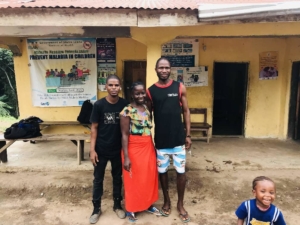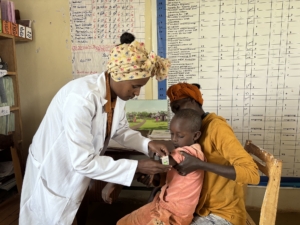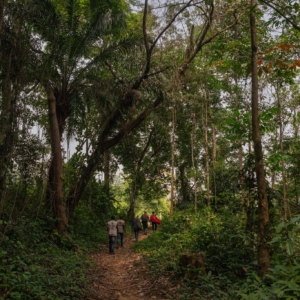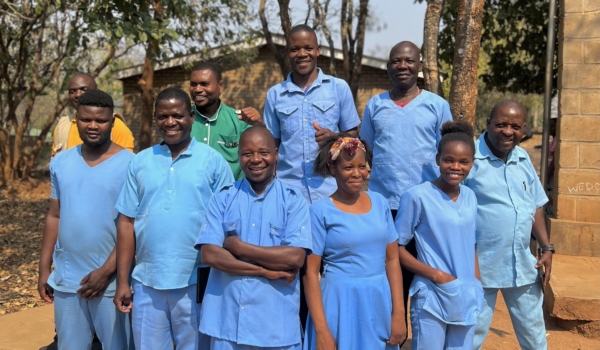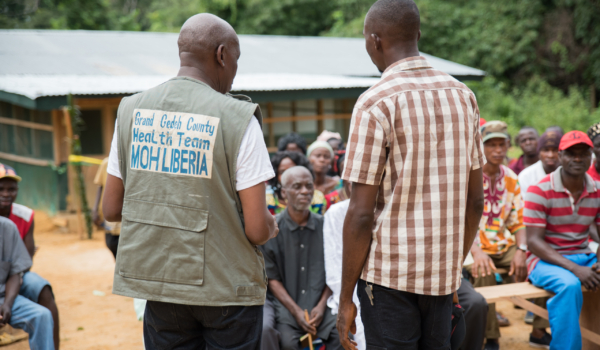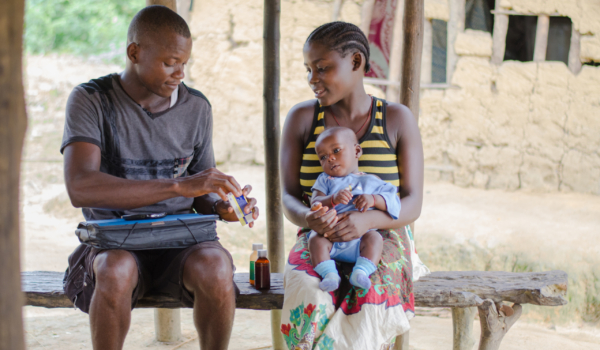By Lisha McCormick, CEO, Last Mile Health
Last month, New York Times journalist Nick Kristof visited Liberia and Sierra Leone, investigating the impact of USAID’s abrupt termination and gathering evidence on deaths resulting from this unprecedented funding disruption. He traveled with Last Mile Health’s Brittney Varpilah and T. Ruston Yarnko to Bong County, one of four Liberian counties where USAID has provided the financial support for the implementation of the National Community Health Program. There, they met John Flomo, a community health worker who was one of over 5,000 paid professionals in Liberia when the national program was fully scaled in July 2024. Now, he’s part of the 30% who are going without pay, supplies, or support due to the end of USAID—not only leaving patients at risk, but threatening the functioning of the overall health system.
“Flomo hasn’t been paid in months but still wears his USAID vest and helps children survive malaria or malnutrition,” Kristof writes. “Do we really mean to abandon dedicated health workers like Flomo who are struggling to help sick or starving children—kids as precious as our own?”
The end of USAID represents a major disruption to health systems globally, and Last Mile Health is working every day alongside our government partners to minimize the harm to patients in the communities we serve. As we navigate this “new normal,” we will assist government partners to prioritize what we know will be essential for sustaining the health improvements we’ve seen in the last two decades:
- Community health workers are the key to achieving universal health coverage. They save lives, even in resource-constrained contexts, and they are crucial for sustainable improvements in health outcomes.
- It’s essential for African governments to own their national health programs—and this requires increased domestic financing.
- Integrated care is the future. Siloed, disease-specific programs are expensive and fail to meet the health needs of patients. Integrated primary care delivery is more cost-effective and beneficial for both patients and providers.
Our work to ensure integrated and inclusive healthcare, owned by governments and led by communities, is more relevant than ever. In countries where Last Mile Health works, here is how this work looks in action:
- We have been working with the Government of Liberia to advocate for additional financing from Gavi, the Global Fund, and others to cover gaps left by USAID, alongside efforts to map increased domestic financing to cover the country’s primary healthcare workers’ salaries.
- Alongside Ethiopia’s Ministry of Health, we have leveraged technology to develop a more effective, cost-efficient approach to community health worker training via a blended learning approach. Now, the government has adopted this approach for all community health worker training, working to scale it to a workforce of more than 40,000, and has taken ownership of training on non-communicable diseases and major communicable diseases.
- In Malawi, we are working to shift HIV services like testing and treatment accompaniment—historically funded by PEPFAR, and now shuttered—to community health workers. This is possible because of the Government of Malawi’s foresight to invest in community health workers and ensure they are on the government payroll.
The termination of USAID dramatically changes the landscape of foreign assistance and puts programs and lives at immediate risk. But this crisis must be a catalyst for collaboration. It’s partners like you who play a critical role in shaping a future that ensures healthcare for all, not some, by supporting work to accelerate government ownership of primary health services. This is a moment for bold action and investment that will equip governments to avoid the collapse of essential services and health systems—while working alongside technical partners to ensure those systems can be sustained in the long term.
Philanthropic partners are essential to realizing a “new normal” that is both durable and viable: government-owned health systems that make integrated services the norm and primary care a priority. It will be the individual donors and brave philanthropists who use this moment to invest in organizations actively working with governments and communities who salvage healthcare today while also shaping durable, integrated health services for communities for generations.
I hope you will join us, our government partners, and community and frontline health workers as we rise to respond to this crisis. What we do today will impact healthcare in rural and remote communities for years to come.
This letter was originally published as part of Last Mile Health’s July 2025 Six-Month Report. Read the full report here.

